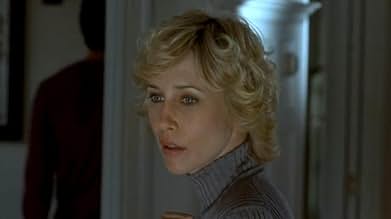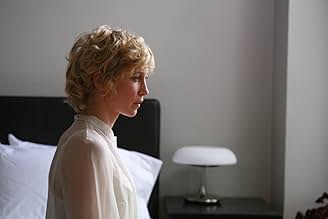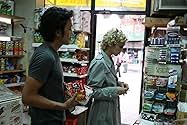AVALIAÇÃO DA IMDb
6,4/10
1,7 mil
SUA AVALIAÇÃO
Adicionar um enredo no seu idiomaWhen an American woman begins a dangerous relationship with an attractive immigrant worker, in order to save her marriage, she finds her true self.When an American woman begins a dangerous relationship with an attractive immigrant worker, in order to save her marriage, she finds her true self.When an American woman begins a dangerous relationship with an attractive immigrant worker, in order to save her marriage, she finds her true self.
- Direção
- Roteirista
- Artistas
- Prêmios
- 1 vitória e 3 indicações no total
David Lee McInnis
- Andrew
- (as David McInnis)
- …
Avaliações em destaque
"Never Forever" is a deeply flawed movie replete with missed opportunities that whiz right past like rush hour buses in front of a motionless commuter. It is also well worth seeing, for a riveting performance by Vera Farmiga, a suggestive plot, and its treatment of unusual topics.
Sophie (Vera Farmiga), a beautiful, blonde, trophy wife, is determined to give Andrew (David McGinnis) her "master-of-the-universe," very wealthy and successful husband, the child he cannot father himself. He is infertile. Her husband is Korean, so she chases down Jihah, (Jung-Woo Ha) an illegal Korean immigrant, and offers him three hundred dollars for every time he has sex with her, and thirty thousand dollars once she gets pregnant. The two perform the act with complete alienation, but eventually develop feelings for each other.
The plot, is, of course, implausible. It reaches its height of silliness when Sophie tells Jihah she will pay him the bonus of $30,000 if she gets pregnant. Why the bonus? Would he really not have sex with this beautiful woman for three hundred dollars if he did not get the bonus? Are there other beautiful women out there offering bonuses of $25,000, and does Sophie need to remain competitive? Further, Sophie reveals no knowledge that a woman is fertile for a short window every month. Is she having sex with Jihah outside of that window of opportunity? Apparently so, because no seasons pass; all the action seems to take place during the same month.
Finally, why not just go to a sperm bank, or use a turkey baster? Indeed, why does Sophie remove every stitch of clothing? You really don't need to remove everything you've got on in order to perform the act necessary for pregnancy. The film's marketers show a healthy respect for the market appeal of nude Vera Farmiga.
Most of the action takes place in Sophie and Andrew's rich, cold, white, empty house and Jihah's squalid, lurid, red-and-green walled tenement. The director did not create enough atmosphere with these two sets. I never get a sense of Jihah's room. In one scene, it rains. That scene should have been milked for all it was worth: two strangers, separated by race and class, united for a moment, in a tiny apartment, as rain falls outside. Sigh.
Also, so much more could have been done with the sex scenes, which are rather flat and unimaginative. Sophie and Jihah connect, and transcend barriers of race and class, through this one act. I wish that they had been depicted with more eloquence.
In spite of the criticisms, this movie is well worth seeing. It isn't prurient. It's really a fairy tale about connection in spite of distance. Like a fairy tale, the film suggests and evokes more than it depicts, and the viewer's imagination is left to fill in the blanks.
"Never Forever" is also worth seeing because it is unusual. This is the only American film with a Korean-born Korean lead with a thick Korean accent that many viewers may ever see. Finally, the film is worth seeing for Vera Farmiga's riveting performance. She conveys volumes with a glance. Sophie is not very bright, and has limited strength. She sits around her gilded cage all day, while her maid cleans her house and her husband works. She's, simply, not very likable, but Farmiga makes Sophie very watchable.
Jung-Woo Ha as Jihah is also fascinating. He's not particularly good looking. He makes for a convincing illegal immigrant. He is short, slight, and wears stained t-shirts. As the film draws closer to him and spends more time with him, though, the viewer can see what is special about him, and comes to care about him this process parallels the experience of falling in love. At first the other may come across as not that special, but as two people get closer together, they see what is special about the other.
Sophie (Vera Farmiga), a beautiful, blonde, trophy wife, is determined to give Andrew (David McGinnis) her "master-of-the-universe," very wealthy and successful husband, the child he cannot father himself. He is infertile. Her husband is Korean, so she chases down Jihah, (Jung-Woo Ha) an illegal Korean immigrant, and offers him three hundred dollars for every time he has sex with her, and thirty thousand dollars once she gets pregnant. The two perform the act with complete alienation, but eventually develop feelings for each other.
The plot, is, of course, implausible. It reaches its height of silliness when Sophie tells Jihah she will pay him the bonus of $30,000 if she gets pregnant. Why the bonus? Would he really not have sex with this beautiful woman for three hundred dollars if he did not get the bonus? Are there other beautiful women out there offering bonuses of $25,000, and does Sophie need to remain competitive? Further, Sophie reveals no knowledge that a woman is fertile for a short window every month. Is she having sex with Jihah outside of that window of opportunity? Apparently so, because no seasons pass; all the action seems to take place during the same month.
Finally, why not just go to a sperm bank, or use a turkey baster? Indeed, why does Sophie remove every stitch of clothing? You really don't need to remove everything you've got on in order to perform the act necessary for pregnancy. The film's marketers show a healthy respect for the market appeal of nude Vera Farmiga.
Most of the action takes place in Sophie and Andrew's rich, cold, white, empty house and Jihah's squalid, lurid, red-and-green walled tenement. The director did not create enough atmosphere with these two sets. I never get a sense of Jihah's room. In one scene, it rains. That scene should have been milked for all it was worth: two strangers, separated by race and class, united for a moment, in a tiny apartment, as rain falls outside. Sigh.
Also, so much more could have been done with the sex scenes, which are rather flat and unimaginative. Sophie and Jihah connect, and transcend barriers of race and class, through this one act. I wish that they had been depicted with more eloquence.
In spite of the criticisms, this movie is well worth seeing. It isn't prurient. It's really a fairy tale about connection in spite of distance. Like a fairy tale, the film suggests and evokes more than it depicts, and the viewer's imagination is left to fill in the blanks.
"Never Forever" is also worth seeing because it is unusual. This is the only American film with a Korean-born Korean lead with a thick Korean accent that many viewers may ever see. Finally, the film is worth seeing for Vera Farmiga's riveting performance. She conveys volumes with a glance. Sophie is not very bright, and has limited strength. She sits around her gilded cage all day, while her maid cleans her house and her husband works. She's, simply, not very likable, but Farmiga makes Sophie very watchable.
Jung-Woo Ha as Jihah is also fascinating. He's not particularly good looking. He makes for a convincing illegal immigrant. He is short, slight, and wears stained t-shirts. As the film draws closer to him and spends more time with him, though, the viewer can see what is special about him, and comes to care about him this process parallels the experience of falling in love. At first the other may come across as not that special, but as two people get closer together, they see what is special about the other.
Vera Farmiga is one of those rare actors that is emotionally present in roles that require vulnerability and honesty. I remember seeing her first in that short-lived TV series "Roar." She alone among all the actors in the cast that included a young Heath Ledger seemed to project real emotions in a series that was flirting close to "Xena" territory.
So Director Gina Kim could not have found a better actor to play the role of Sophie, a woman who must make difficult choices involving two men and their respective worlds. Much will be made in Asian American circles about the intimate scenes Farmiga has with men of Asian descent. Beyond the novelty of such pairings in film, these scenes underscore one of the peculiar aspects of the movie: while the men in these scenes go through the (ahem) motions, Farmiga actually acts.
That disparity is apparent in almost every scene Farmiga has with the Asian actors. While the male leads, Jung-woo Ha and David McInnis, are dutiful journeymen in their roles, they don't reach the honesty that Farmiga is able to bare. Against Farmiga's acting, Ha's and McInnis's performances come across almost as recitation.
I can see Ha's delivery fitting seamlessly in a cutesy Korean miniseries. Someone should tell male actors not to grip their hair with both hands when the scene calls for inner turmoil. It comes off as pantomime. That "someone" should have been the director. While plot and composition worked well, I found Kim's direction of the acting lacking. Perhaps she was working within the limitations of the acting abilities of the male leads. In that particular case, she should have recast those roles.
The lapses in the direction of the actors are apparent when lines are spoken by the male leads. There is an odd stiffness to the delivery that sounds "off" to native-speakers and those of us who immigrated to the States at a young age. Something in the cadence and intonation that distinguishes someone reading Shakespeare and someone speaking as Hamlet. Ha may have had an English tutor in Korea that spent too much time in-country, because he actually does a fine job with lines he speaks in Korean. I marvel at actors who can truly act in two different languages. Sidow and Streep easily come to mind.
Kim isn't a native speaker and so she will have to develop a sensitivity to the sound of spoken English as other non-native directors have had to do. That "ear" is what she will have to develop if she is going to be casting less-gifted or less-experienced talent. Ang Lee had the same problem in his early English language movies and those actors fresh out of Juilliard. It's the difference between Jean-Pierre Jeunet directing Dominique Pinon in French and Jeunet and Pinon, respectively, in English. "Alien: Resurrection" was a just an action movie and the weird delivery by Pinon and some of the supporting cast was noticeable. (Sigourney Weaver made out on her acting chops alone.)
Thankfully, this movie is centered around Sophie and so Farmiga binds the narrative with her honest performance. The role of Sophie really could have been played by an Asian actor and the story could have been a Korean-language movie about a Korean American woman. Perhaps Kim wanted to give emphasis to Sophie's isolation and to that central dilemma of the story.
There are certain elements of Korean and Korean American culture that are played to near-caricature: the cold, oppressive mother-in-law and the zealous pastor, for instance. So, I must wonder if the story came from Kim's own deliberation about her relationships and choices she has had to make as a Korean and a Korean American.
For Farmiga, it is another remarkable performance to add to her growing body of work.
So Director Gina Kim could not have found a better actor to play the role of Sophie, a woman who must make difficult choices involving two men and their respective worlds. Much will be made in Asian American circles about the intimate scenes Farmiga has with men of Asian descent. Beyond the novelty of such pairings in film, these scenes underscore one of the peculiar aspects of the movie: while the men in these scenes go through the (ahem) motions, Farmiga actually acts.
That disparity is apparent in almost every scene Farmiga has with the Asian actors. While the male leads, Jung-woo Ha and David McInnis, are dutiful journeymen in their roles, they don't reach the honesty that Farmiga is able to bare. Against Farmiga's acting, Ha's and McInnis's performances come across almost as recitation.
I can see Ha's delivery fitting seamlessly in a cutesy Korean miniseries. Someone should tell male actors not to grip their hair with both hands when the scene calls for inner turmoil. It comes off as pantomime. That "someone" should have been the director. While plot and composition worked well, I found Kim's direction of the acting lacking. Perhaps she was working within the limitations of the acting abilities of the male leads. In that particular case, she should have recast those roles.
The lapses in the direction of the actors are apparent when lines are spoken by the male leads. There is an odd stiffness to the delivery that sounds "off" to native-speakers and those of us who immigrated to the States at a young age. Something in the cadence and intonation that distinguishes someone reading Shakespeare and someone speaking as Hamlet. Ha may have had an English tutor in Korea that spent too much time in-country, because he actually does a fine job with lines he speaks in Korean. I marvel at actors who can truly act in two different languages. Sidow and Streep easily come to mind.
Kim isn't a native speaker and so she will have to develop a sensitivity to the sound of spoken English as other non-native directors have had to do. That "ear" is what she will have to develop if she is going to be casting less-gifted or less-experienced talent. Ang Lee had the same problem in his early English language movies and those actors fresh out of Juilliard. It's the difference between Jean-Pierre Jeunet directing Dominique Pinon in French and Jeunet and Pinon, respectively, in English. "Alien: Resurrection" was a just an action movie and the weird delivery by Pinon and some of the supporting cast was noticeable. (Sigourney Weaver made out on her acting chops alone.)
Thankfully, this movie is centered around Sophie and so Farmiga binds the narrative with her honest performance. The role of Sophie really could have been played by an Asian actor and the story could have been a Korean-language movie about a Korean American woman. Perhaps Kim wanted to give emphasis to Sophie's isolation and to that central dilemma of the story.
There are certain elements of Korean and Korean American culture that are played to near-caricature: the cold, oppressive mother-in-law and the zealous pastor, for instance. So, I must wonder if the story came from Kim's own deliberation about her relationships and choices she has had to make as a Korean and a Korean American.
For Farmiga, it is another remarkable performance to add to her growing body of work.
I am Korean working as a writer/director in America. The director studied in the same film school but I never met her. That was the only interest in this film.
I always didn't liked Vera Farmiga. I thought that her acting is awful since she feels so much about her look when she is acting. I never saw her getting into her character truly.
But in this film she was pretty good. At the beginning,she was not so good as usual. But as time goes by, I felt that she is feeling what her character needs and wants.
I still don't think that it's her hidden ability that made this possible but rather her effort working with the director.
Above all, I was very impressed about the film. There are a lot of layers in the story, each characters' emotion and of course the light and shadow in the mis-en-scene.
It's a wonderful art movie.
I always didn't liked Vera Farmiga. I thought that her acting is awful since she feels so much about her look when she is acting. I never saw her getting into her character truly.
But in this film she was pretty good. At the beginning,she was not so good as usual. But as time goes by, I felt that she is feeling what her character needs and wants.
I still don't think that it's her hidden ability that made this possible but rather her effort working with the director.
Above all, I was very impressed about the film. There are a lot of layers in the story, each characters' emotion and of course the light and shadow in the mis-en-scene.
It's a wonderful art movie.
Watching this movie was a breathtaking experience to me. From the very first scene, it grabbed my attention, and I became more and more involved with the story of this beautiful and desperate woman, Sophie Lee.
The movie touches so many important issues such as interracial marriage, faith and religion, class determined by economic factors, and illegal immigrant. Yet those issues are so well blended without distracting the audience' attention from the main story.
The main story is purely simple. It's a woman's struggle to keep a man she loves happy. But in the end, she realizes that she has to pursue her own happiness.
It's the story of my own life. It's the story of so many women that I know. It's also the story of so many sons and daughters, wives and husbands, and fathers and mothers. That's why this movie touches the very core of my heart - anybody's heart.
The visual elements are very powerful. Extremely shallow focus are used in many scenes, isolating the characters from the background and sometimes from each other. However camera is never in the way of story telling.
The most notable element of the movie is, needless to say, the outstanding performances by Vera Farmiga, Jung-Woo Ha and David McInnis. Especially I was overwhelmed by the powerful screen presence of Vera's delicate feature. She can be funny, sexy and innocent without even trying. She becomes the woman I'd love to be friends with. She becomes the lover I'd cherish and hold in my arms, and the mother I'd look up to. She arouses so many emotions within me that through her I face my own womanhood and independence.
After watching the movie, I thought makers of "Unfaithful" should watch this movie to learn that an affair can have such depth, profundity and purity...
The movie touches so many important issues such as interracial marriage, faith and religion, class determined by economic factors, and illegal immigrant. Yet those issues are so well blended without distracting the audience' attention from the main story.
The main story is purely simple. It's a woman's struggle to keep a man she loves happy. But in the end, she realizes that she has to pursue her own happiness.
It's the story of my own life. It's the story of so many women that I know. It's also the story of so many sons and daughters, wives and husbands, and fathers and mothers. That's why this movie touches the very core of my heart - anybody's heart.
The visual elements are very powerful. Extremely shallow focus are used in many scenes, isolating the characters from the background and sometimes from each other. However camera is never in the way of story telling.
The most notable element of the movie is, needless to say, the outstanding performances by Vera Farmiga, Jung-Woo Ha and David McInnis. Especially I was overwhelmed by the powerful screen presence of Vera's delicate feature. She can be funny, sexy and innocent without even trying. She becomes the woman I'd love to be friends with. She becomes the lover I'd cherish and hold in my arms, and the mother I'd look up to. She arouses so many emotions within me that through her I face my own womanhood and independence.
After watching the movie, I thought makers of "Unfaithful" should watch this movie to learn that an affair can have such depth, profundity and purity...
Vera Farmiga plays an affluent woman whose life and marriage is unraveling. She and her Korean husband have been trying without success to get pregnant. Her suicidal husband has given up on the idea, but it's become an obsession with her, the one thing that will fix everything that's broken. She makes a proposition to a young Korean immigrant -- she will pay him $300 in cash every time they have sex, with an additional $30,000 in cash if she conceives.
I had my doubts before watching this film that the screenplay would be able to make this premise plausible, but it does. It sets things up in such a way that they play out honestly, without feeling overly manipulated by the hands of a screenwriter or director. It helps tremendously that Farmiga gives such a good performance -- you have to really understand her character if the movie is going to make any sense, and we do, thanks to Farmiga's commitment to the role.
Though ambiguous, the ending suggests a happy ending that DID feel implausible to me. But the rest of the movie is such a downer that I actually didn't mind it, because I just wanted something positive to happen to this poor woman.
Grade: B+
I had my doubts before watching this film that the screenplay would be able to make this premise plausible, but it does. It sets things up in such a way that they play out honestly, without feeling overly manipulated by the hands of a screenwriter or director. It helps tremendously that Farmiga gives such a good performance -- you have to really understand her character if the movie is going to make any sense, and we do, thanks to Farmiga's commitment to the role.
Though ambiguous, the ending suggests a happy ending that DID feel implausible to me. But the rest of the movie is such a downer that I actually didn't mind it, because I just wanted something positive to happen to this poor woman.
Grade: B+
Você sabia?
- CuriosidadesIn France, was released on DVD more than three years after its theatrical release.
- Trilhas sonorasEs War Erde In Inhen
Music by Michael Nyman
(from Six Celan Songs)
Text by Paul Celan
© 2006 Michael Nyman Ltd / Chester Music Led
Recording: MN Records MNRCD108 (p) + © MN Records Ltd
Performed by Hilary Summers (contralto), Michael Nyman Band
Principais escolhas
Faça login para avaliar e ver a lista de recomendações personalizadas
- How long is Never Forever?Fornecido pela Alexa
Detalhes
Bilheteria
- Orçamento
- US$ 3.500.000 (estimativa)
- Faturamento bruto nos EUA e Canadá
- US$ 14.485
- Fim de semana de estreia nos EUA e Canadá
- US$ 6.529
- 13 de abr. de 2008
- Faturamento bruto mundial
- US$ 689.473
Contribua para esta página
Sugerir uma alteração ou adicionar conteúdo ausente



































